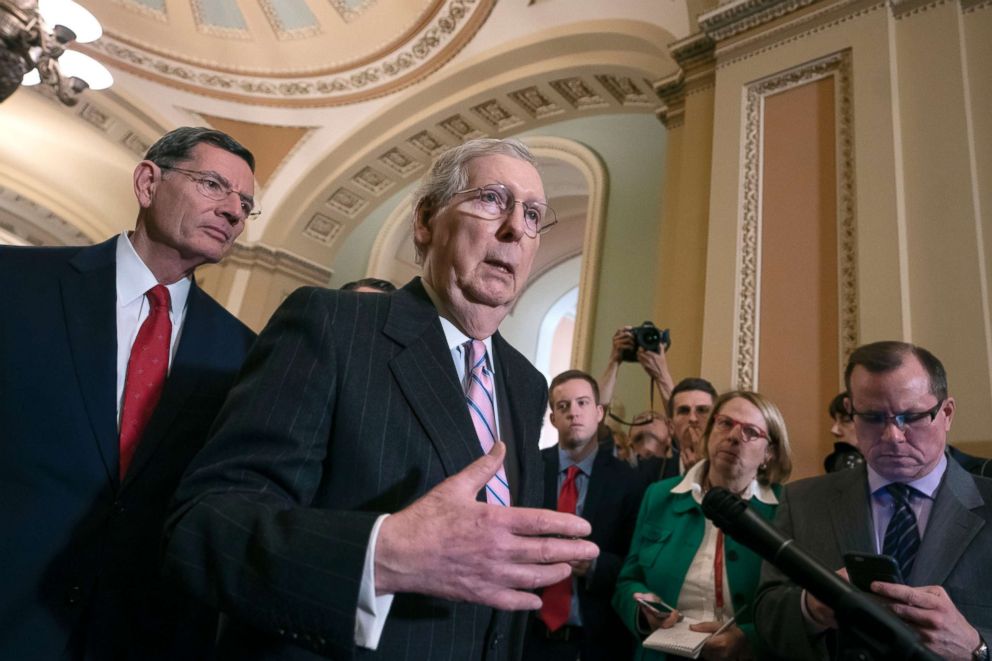White House seeks to limit number of defections on resolution of disapproval
“Support is crumbling," one top GOP Senate aide told ABC News.
The Senate will vote on a resolution of disapproval to terminate President Trump’s emergency declaration to build the border wall on Thursday, the top Republican in the Senate Mitch McConnell announced Tuesday.
The resolution of disapproval is expected to pass in an embarrassing rebuke to the president, despite a lobbying effort by the White House to clamp down on the number of Republicans who might vote with Democrats in supporting the resolution.
Four Republican senators including Susan Collins of Maine, Thom Tillis of North Carolina, Lisa Murkowski of Alaska, and Rand Paul of Kentucky have previously announced they will vote to support the resolution along with all 47 Democrats.
One Republican senator signaled there are anywhere between three to eight Republicans who are likely to vote in support of the resolution.
However, it’s unclear at this point if the Senate has the votes to override a presidential veto – Trump’s first. He is expected to retain a veto-proof majority in the House.
“I think there will be enough votes to pass the resolution in the Senate, not nearly enough to override a veto, and we'll move on. And the president will keep building the wall,” GOP Sen. Lindsey Graham, a top ally of the president’s, said to reporters Tuesday.

Senate Republicans – in hoping to avoid another stinging embarrassment to the president – are seeking to limit the number of defectors within their caucus who would buck Trump on the resolution of disapproval.
Many Republicans have expressed their concerns about the president’s ability, under the declaration, to move funds that have already been appropriated by Congress. They've also said they are concerned about the precedent it could send should a Democrat become president.
Vice President Mike Pence was on Capitol Hill Tuesday afternoon meeting with Republicans on a potential deal on a separate piece of legislation that would alter the National Emergencies Act, in an effort to assuage senators who have issues with Trump's emergency authority.
One of the proposals under consideration is from Utah GOP Sen. Mike Lee and is designed to give Congress some authority over the emergency powers granted to the president.
His proposal would amend the National Emergencies Act of 1976 to say an emergency declaration would automatically expire after 30 days unless both chambers of Congress vote to approve it.
“It becomes a resolution of approval, not disapproval,” Lee told reporters, though he said he has not yet decided on how he will vote on the resolution of disapproval that will be voted on Thursday.
McConnell acknowledged earlier Tuesday that "there's a lot of discomfort with the law."
"Not that the president doesn't have the authority to do what he is doing," he said during a press conference. "I think most of my members now believe this is not a constitutional issue in that sense, but rather is this grant of authority to any president, not just this one, any president, was it too broad back in the 70s when it was passed?"
At this point, it is unclear what the White House will do on the Lee measure, but it appears to be providing an off-ramp to a number of Republicans who were concerned about the President’s move but did not want to be seen as opposing him.

Instead of a robust GOP vote rebuffing the president’s declaration, a senior Senate GOP aide now tells ABC News, “Support is crumbling.”
A White House official told ABC News that while no commitments were made during Pence's visit, he said he’d relay their message to Trump.
“Some minds have been changed,” GOP Sen. John Kennedy of Louisiana said. “I’m hoping my colleagues who are on the fence will vote for the Lee bill, instead of against the President.”
“It’s time to vote,” Kennedy added. “We’ve discussed this enough. It may be that some might be willing to vote to support the president in exchange for the ability to deliberate about how we can reform, fix…the National Emergencies Act. I’m not predicting that will happen, but I think it’s a realistic possibility.”
The House already passed a resolution of disapproval to nullify Trump’s emergency declaration last month.
Trump declared a national emergency at the southern border on Feb. 15, taking executive action to obtain billions of dollars for his border wall on top of $1.4 billion Congress sent him earlier last month for border fencing.
ABC News' Trish Turner and Jordyn Phelps contributed to this report.





